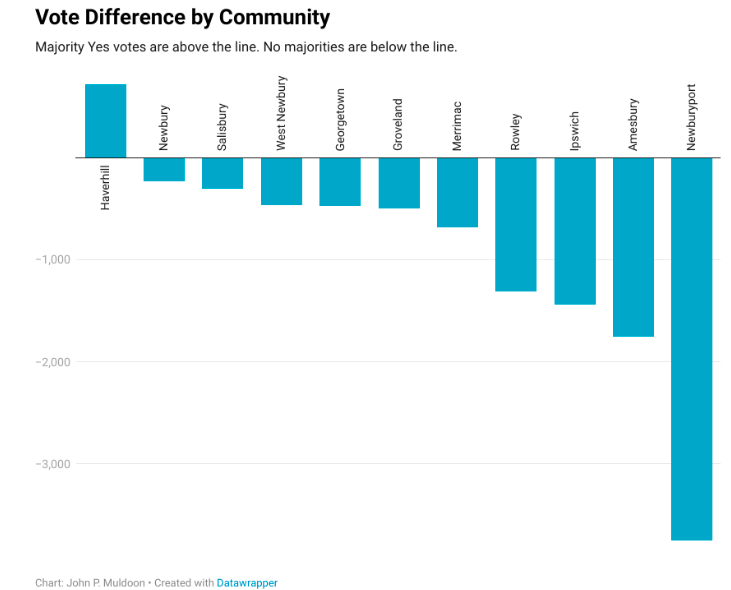After almost three-quarters of district voters voted against the proposal, the Whittier Tech school board has abandoned the plan to build a new $444.6 million school. The majority of the 11 communities that send students to Whittier voted “no” in the district-wide election that took place on January 23rd. The average turnout was only 19.1% of registered voters across participating towns in this election.
Ipswich town leaders said the new school project, announced in September 2023, took them by surprise and left little time for them to plan or come up with the millions of dollars that would be needed.
“All big major capital projects in this town, we spend 5, 10 years planning it, not 5, 6 months,” said Scott Jewell, a long-term Ipswich resident and Middle School tech-ed teacher. “The communication from Whittier about this long-term financial obligation we are going to have is not very good… that’s my biggest frustration.” Both Ipswich’s select board and school committee sent letters voicing complaints and requesting a pause.
The Massachusetts School Building Authority approved $157 million for the new school, leaving Whittier only 120 days to obtain local funding for the rest. After state and government grants, member communities were asked to come up with $264 million for the new school. The January 4th Ipswich School Committee meeting voted 6-1 in favor of supporting Whittier Tech’s proposal to build a new school. If the Whittier project was approved, it would have cost Ipswich $20.4 million plus interest over 34 years.
The superintendent of Whittier, Maureen Lynch, has pointed out several times that failure to vote for the funds would result in costing member communities $100 million more than the current proposal. Delaying this inevitable project could lead to more costs, and the committee agrees that vocational schools should be invested in, as lately society has been neglecting that aspect of education.
Those opposed to the proposal pointed out the short notice of this project. There was also frustration surrounding the fact that this financial obligation would force other projects to be delayed further due to a lack of funding, such as the elementary school projects. Ipswich also only sends some 28 students to Whittier, a small fraction of the total population.
Student Representative of the School Committee Board Jimmy Bornstein was conflicted when he stated, “… I feel like we should be paying for the school to be upgraded, because I think a lot of students have a hard time… On the other side you see that it could infringe on what we have in our own town, and it could take money away from our other needs in our own district.” The current building was constructed in 1973, some 50 years ago. Bornstein described it as “really dingy and dark. It’s falling apart in my opinion… It does not look like a very inviting space.”
Jewell explained the history of vocational education: “The whole vocational system was invented in the 1960s. They were part of the national defense and it came out of the GI Bill. That’s when Sputnik happened, and we realized that math and science are the most important subjects, and we needed to have educated people to be able to do the new, defense-type stuff. They created a whole educational path called vocational education across the country; it was part of the GI Bill, and it is an extremely foundational part of our entire society. It’s that important.”
Bornstein also stressed the necessity of vocational schools, adding that “… not everybody wants to go to college and not everybody needs to. There’s other jobs out there that don’t require a degree and additional schooling… [I]t also allows [students] to explore different options if they’re not sure. And even if they do attend college they’ve experienced all these different trades.”
A nicer facility might persuade more students to attend the school. Borstein said that a lot of kids “choose to go to Essex Tech, because their school is so much nicer… whereas if we upgrade Whittier maybe more students would go.”



